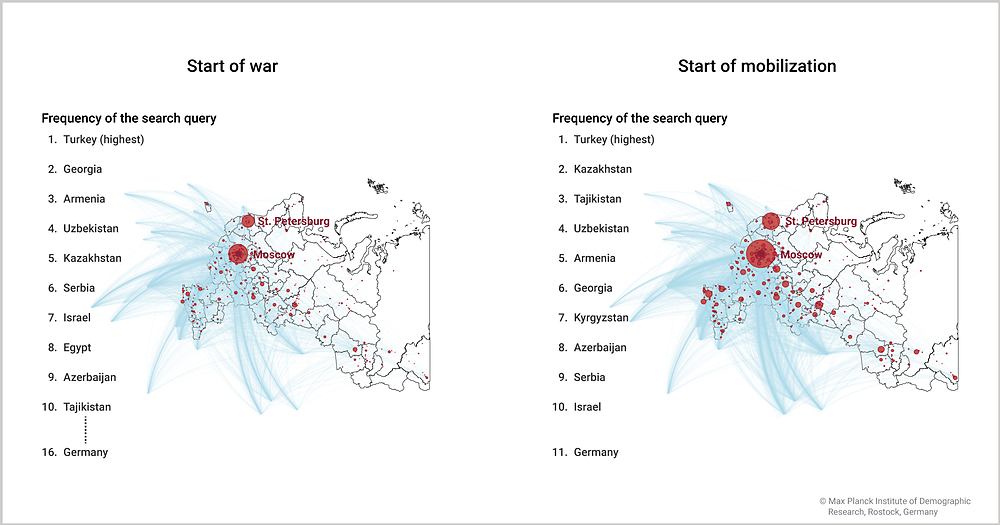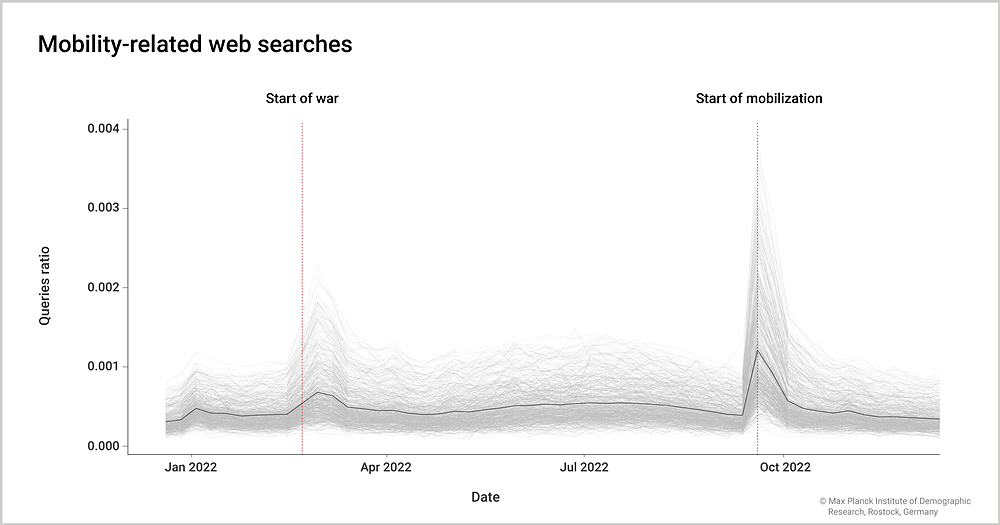January 16, 2025 | News | Russia
Willing to Emigrate

© istockphoto.com/samxmeg
Media reports say that many Russians wanted to leave their country after Russia's attack on Ukraine. But data to verify this are not available. A team of researchers has now leveraged a rarely used data source to examine whether this assumption can be proven by science.
The Russian invasion of Ukraine in February 2022 not only resulted in many Ukrainians fleeing their country. Russian citizens, too, left their country and this for fear of military mobilization, state repression, and to escape the effects of the economic downturn predicted at that time. The media back then reported that many Russians want to leave the country, and there was talk of a Russian exodus. It is not known, however, whether they truly left at exodus scale. Some estimates suggest that several hundred thousands of Russians are living in exile. But official data to confirm this is missing.
A team led by Athina Anastasiadou from the Max Planck Institute for Demographic Research has homed in on this particular narrative in the media. The researchers wanted to know whether it can be proven by science. Because official data on migration for Russia they could have worked with was missing at that time, the researchers chose another data source that has hardly played a role in demographic research so far: the Russian search engine Yandex. The scientific basis for this decision is rooted in the so-called theory of planned behavior.
The theory says that the best predictor of a specific behavior is the intention to perform that behavior. The scientists' idea was that in the digital age, people prepare their journeys by searching online. If they intend to emigrate, they would then have to leave digital traces that provide clues about a planned departure. For their study, published in the specialist journal Demographic Research, the researchers thus analyzed how often certain mobility-related search terms were entered into Yandex in connection with likely destination. Search engine data are widely used in demography to study international mobility. But the most common of these is Google Trends, an online service of the US search engine Google. It provides information on the search terms entered by users of Google search and how often they did so. Yandex is a Russian-Dutch company based in Amsterdam. With a 62.% market share, Yandex is the most popular search engine in Russia. It’s data source, Yandex Wordstats, is not widely used yet as a data source for research; thus, ascertaining that these data are “fit for use” is already a result of the study.
To find out whether many Russians planned to emigrate indeed, the researchers combined the number of mobility-related search terms with 48 of the most likely destination countries and their capitals, including most European member states and Russia's immediate neighbors. Many of these countries are popular tourist destinations for Russians, and some have entry regulations relatively relaxed for Russian citizens. As mobility-related search terms, they used words associated with planning to leave the country, such as “relocation,” “work,” and “residence permit.” At the geographic level, the data provided by Yandex are very detailed. The researchers had access to data on all 83 Russian regions and to the 388 cities and towns at the municipal level.

Geographic variation in the number of mobility-related web searches and links between origin cities and potential destination countries for the three-week periods following the Russian invasion of Ukraine (February 2022) and the announcement of military mobilization (September 2022). The size of the red circles indicates the overall increase in the number of mobility-related searches for each city, and the darkness of the blue lines indicates the increase in the number of searches from a city that specified each potential destination country. The increase is calculated as the difference between the number of queries three weeks after and three weeks before invasion or mobilization. The map focuses on the western part of Russia because that is where the larger cities are located. © MPIDR
Figure
The researchers discovered that the search data showed significant increases in search queries shortly after Russian troops started to invade Ukraine in March 202 and right after mobilization efforts by the Russian army began in September 2022, thus indicating increased interest in leaving the country. The number of search queries was particularly high for countries where many Russians already live and for countries in the immediate vicinity of Russia (see Fig. 1). Strikingly, the increase in mobility-related search behavior was significantly greater after the announcement of mobilization than after Russia's invasion of Ukraine (see Fig. 2).

Share of total weekly mobility-related searches conducted at city level (gray lines) in Russia and their average (black line). Red dotted lines show Feb. 24, 2022 (invasion of Ukraine by the Russian army) and Sept. 21, 2022 (mobilization start). © MPIDR
Download Figure (PNG File, 692 kB)
The researchers also compared the data with UN data on Russian migrants and turned to data on socio-economic indicators from the Russian statistics offices. They discovered that the number of Russian migrants arriving in other countries was positively related to the search behavior. They also found that countries in the immediate vicinity of Russia were looked at more frequently. This can be explained on the grounds that leaving for regions closer to Russia incurs lower migration costs. But migration research also knows that migrants tend to move more often to countries that already have a high number of fellow nationals. This is also true for countries bordering Russia. Another result of the study is that in large cities obviously more people toyed with the idea to emigrate (and then perhaps followed it through). This is plausible because large cities often have airports. Further, affluent areas had more people who performed corresponding searches, possibly indicating that people better off socio-economically more likely consider emigrating. This, in turn, may be an indication of a possible brain drain.
But the researchers point out that Yandex search data come with a number of limitations, similar to Google Trends. Online search data do not reflect the behaviors and preferences of the entire Russian society or the people conducting the searches. And search queries do not necessarily result in emigration. The procedure of collecting and producing the data is not fully transparent too, meaning that the researchers cannot make any claims about the quality of the data generating processes, they say.
Original Publication
Anastasiadou, A., A. Volgin and D.R. Leasure: War and mobility: using Yandex web searches to characterize intentions to leave Russia after its invasion of Ukraine. Demographic Research 50(2024)8, 205–220.
DOI: 10.4054/DemRes.2024.50.8